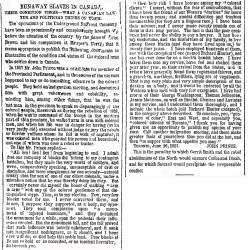Record Data
Transcription
THEIR CONDITON [CONDITION] THERE -WHAT A CANADIAN LAWYER AND POLITICAN [POLITICIAN] THINKS OF THEM
The operations of the Underground Railroad Company have been so prominently and conspicuously brought up before the attention of the country by the fiasco of John Brown and his companions at Harper's Ferry, that it seems appropriate to publish the following documents in illustration of the condition and status of the colored man who settles down in Canada.
In 1857, Mr. John Prince was a candidate for member of the Provincial Parliament, and in the course of the canvass happened to say or do something offensive to the colored people. They hold an indignation meeting, and denounced him with great vehemence and volubility, reminding him among other things, that he was the last man in the province to speak so disparagingly of the colored people, inasmuch as during the rebellion of 1838, when he was in command of the troops in the western part of this province, but walked arm in arm with colored men, and when his life was in danger for having (as he very justly did) executed without judge or jury the rebels or border ruffians whom he fell in with or captured. It was colored men who guarded his person and household, not one of whom was ever a rebel or traitor.
To this Mr. Prince replied: -
"All lies! lies! lies! from beginning to end. I admit that one company of blacks did belong to my contingent battalion, but they made the very worst of soldiers, and were, comparatively speaking, unsusceptible of drill or discipline, and were conspicuous for one act only - a stupid sentry shot the son of one of our oldest colonies, under a mistaken notion that he was thereby doing his duty. But I certainly never did myself the honor of walking "arm in arm" with any of the colored gentlemen of that distinguished corps. Then, as to my election. Few, very few blacks voted for me. I never canvassed them, and hence, I suppose they supported, as a body, my opponent. They took compassion upon "a monument of injured innocence," and they sustained the monument for a while, upon the pedestal their influenced erected. But the monument fell, and the fall proved that such insistence was merely ephemeral, and it sank into insignificant nothingness, as it should, and I hope ever will do; or God help this noble land. Poor blackers! Be not so bold or so conceited, or so insolent hereafter, do beseech you.
"Then how rich I have become among my "colored clients." I report, without the fear of contradiction, that I have been the friend of our Western "darkies" for more than twenty years; and amidst difficulties and troubles innumerable (for they are a litigious race,) I have been their adviser; and I never made twenty pounds out of them in that long period. The fact is that the poor creatures had never the ability to pay a lawyer. It has been my misfortune, and the misfortune of my family, to live among those blacks (and they have lived upon us,) for twenty-four years. I have employed hundreds of them, and with the exception of one (named Richard Hunter) not one has ever done for us a week's honest labor. I have taken them into my service, have fed and clothed them year after year, on their arrival from the States, and in return have generally found them rogues and thieve, and a graceless, worthless, thriftless, lying set of vagabonds. That is my very plain and very simple description of the darkies as a body, and it would be endorsed by all the Western white men with very few exceptions. I have had scores of their George Washingtons, Thomas Jeffersons, James Madisons, as well as Dinahs, Bleniras, and Lavinias in my service, and I understand them thoroughly, and I include the whole batch (old Richard Hunter excepted), in the category above described. To conclude, you, "gentlemen of color," East and West, and especially you "colored citizens of Toronto," I thank you for having given me an opportunity to publish my opinions of your race. Call another indignation meeting, and there make greater fools of yourselves than you did at the last, and then "to supper with what appetite you may."
Toronto, June 26, 1856 John Prince.
This is the paradise to which Gerrit Smith and the rabid abolitionists of the North would ensnare sparto Cuffee and Dinah and for which Seward would precipitate the irrepressible conflict.





